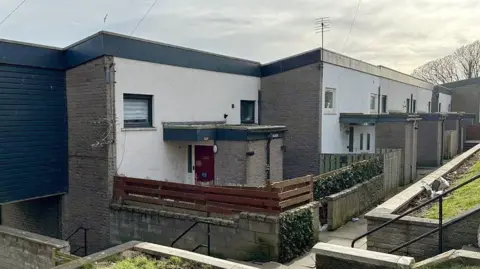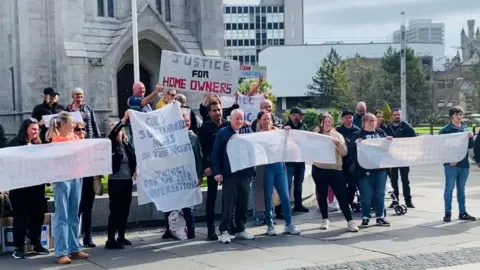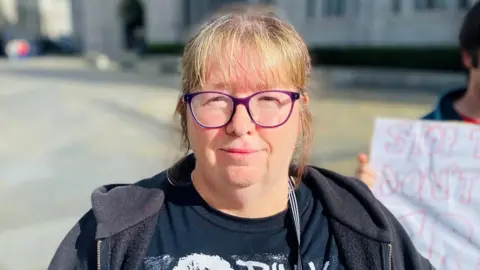
 BBC
BBC
Hundreds of homes in Aberdeen affected by potentially dangerous concrete are to be demolished and rebuilt at an expected cost of more than £150m.
Reinforced autoclaved aerated concrete (RAAC) was identified in more than 500 council and private properties earlier this year.
A protest was held outside Aberdeen City Council headquarters before a meeting discussing the issue, with banner messages including "justice for home owners".
Councillors have voted to begin the demolition process, and then to look at the best way to tackle a rebuilding programme, which could take several years.
Of the 504 properties involved, 366 are council addresses and 138 are private.
It is estimated demolition could cost between £20m and £25m and take up to four years.
It is thought the rebuilding could cost £130m and take between five and 15 years.
Discussions about funding between the authority and the Scottish government are ongoing.


Council officers told the meeting there was "no perfect solution", but that doing nothing was not an option.
They said they had narrowed down the options to three.
These were:
- remove RAAC panels and refurbish homes to modern energy-efficient standards
- demolition only
- demolition and build new homes.
They recommended demolition and building new homes as the preferred option, and sought initial funding to make a start on the process.
Options for the best way to progress redevelopment will now be assessed.
'Community crisis'
In a statement read to councillors, Hannah Chowdhry had said she became a home-owner at 19, but had now been left with "anxiety and despair" after RAAC was discovered.
She described the situation as a "community crisis", with properties devalued, while the residents felt "betrayed, abandoned and voiceless".
And the Torry Community RAAC Campaign said they were "very angry".


Before the meeting, protestor Janice Mackie had told BBC Scotland News: "We’ve just been left in limbo.
"To think one minute you’ve got a house for life, the next minute you’re being told your house is being demolished.
"I’m a homeowner. What am I supposed to do? I’m not going to be able to get another mortgage."
She added: "I’ve had lots of sleepless nights because I just don’t know what I’m going to do."
'Hard decision'
Councillor Miranda Radley, convener of the communities, housing and public protection committee, described it as "one of the hardest decisions" the council had taken.
"We recognise the impact this will have on residents, many having lived in their home for many years," she said.
“The absolute priority has to be their safety.
"The welfare of people is what matters most, and we will continue to offer individuals and families one-to-one support whilst meeting their housing needs as far as possible from existing stock."
